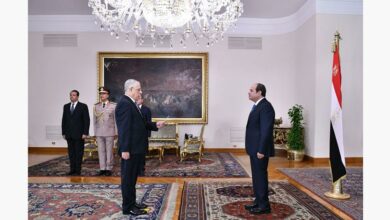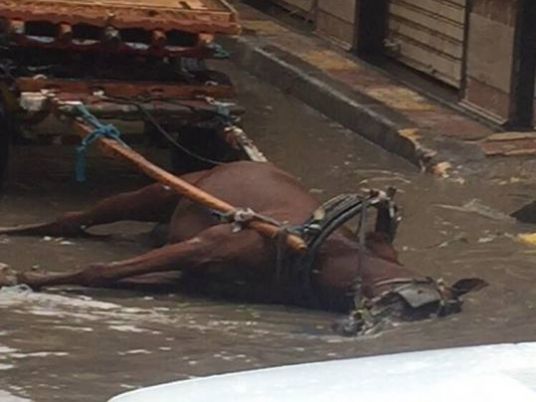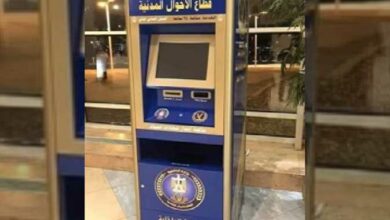One after the other, police and security officers accused of killing protesters during the 25 January uprising have received light verdicts or been exonerated altogether. To date, around two dozen accused officers have received accommodating verdicts from criminal courts, even as the martyrs of the revolution are held up as an issue every political force can rally around.
Human rights lawyers say that the current legal system lacks the will and the mechanisms necessary to fairly prosecute cases with multiple defendants in which the state is involved, such as those with the alleged killers of protesters.
“The law and judiciary are being used against the revolution,” says Ahmed Ragheb, the director of the Hisham Mubarak Law Center.
Ragheb believes that the current legal system, devised under the Mubarak regime, is still serving its own interests.
“Now the revolution needs to have its own laws,” he says.
Last December, five officers accused of killing protesters in front of the Sayeda Zeinab Police Station were found not guilty, the first verdict to bring about fears that the grief-stricken families of about 1,000 individuals killed while protesting would not see just retribution.
The hope for justice was renewed last May by the harsh rulings against officer Mohamed al-Sunni, accused on seven different counts of killing protesters in Zawya, a district of northern Cairo. After failing to appear in court, which customarily prompts the judge to give a harsh judgment, Sunni was sentenced to death, a life sentence and other long periods of jail time in different cases.
Sunni appeared in court during a retrial, however, and was completely exonerated of most of the cases. He is waiting for the results of appeals in the other cases of killing protesters.
Three officers from the Hadayek al-Kobba Police Station in northern Cairo were acquitted last month, while another seven received a mild one-year probationary sentence after being found guilty of shooting protesters.
Weak cases
Ragheb says that, as a crime that was committed by the police force as a whole based on orders from the state, the only way to obtain a just ruling is to prosecute all those involved in the killing of protesters in one group trial.
He says that because of the lack of necessary mechanisms to prosecute, the crimes of the Mubarak regime were broken down into individual crimes tried separately, underplaying their gravity and political significance.
By trying the crimes of a regime as ordinary individual crimes, the court overlooks the principle of “general knowledge,” Ragheb says. This, in the case of killing protesters, consists of the thousands of witnesses who saw protesters being killed by police, which should be taken into consideration in the absence of material evidence of the crime, he adds.
The former president, his interior minister and six senior security officials are facing charges of conspiring to commit premeditated and attempted murder, and of ordering police to shoot protesters. The judgment in this case is scheduled for May.
Policemen accused of carrying out those orders are facing charges either as individuals or small groups, depending on the geographical area where the crime took place.
Fragmentation of the charge of killing protesters is not limited to separately prosecuting those implicated. In some cases, a single officer faces several trials for the same charge.
In what Sunni’s lawyer perceives as a mistake by the prosecutor, Sunni is facing several trials for the same charge of killing protesters, each based on a different group of victims’ families filing a case against him.
Ahmed Hossam, a lawyer with the Egyptian Initiative for Personal Rights, says that while prosecuting crimes in the district where they happen is standard procedure, it doesn’t reflect a true desire to prosecute. The attorney general has the authority to refer them to a single trial due to the special nature of the crime, which would allow for a more just trial, he says.
Ragheb is part of a campaign called “Prosecute Them,” which is in the process of drafting a law to submit to Parliament that would allow for the prosecution of figures from the Mubarak regime.
The law suggests the formation of a temporary revolutionary criminal court that would prosecute the crimes of the Mubarak regime as related parts of a corruption plan carried out by the regime over the course of 30 years.
The court would be made up of members chosen by the Supreme Judicial Council, granted that they haven’t held an executive post under Mubarak. The initiative doesn’t call for a special court; the suggested court would adhere to all Egyptian laws and international charters, and allow appeals.
Security investigating itself
Lawyers blame the lack of evidence to indict police officers on deliberate negligence from the prosecutors and authorities investigating the crimes.
The process of prosecuting these cases starts with a notice submitted to the prosecutor by the families of victims and their lawyers. After that, the prosecution investigates the complaint and refers it to investigative bodies, which are part of the Interior Ministry, to find the suspect.
With thousands of eyewitness accounts given to the prosecutor about the killing of protesters, lawyers blame the public prosecution for not investigating the cases properly.
Seeing as the police investigating the case are involved in the crimes, Hossam says that the prosecutor is responsible for supervising the investigations to ensure their neutrality.
Attorney General Abdel Meguid Mahmoud was appointed by Mubarak and served under him for five years. Mahmoud has been accused of corruption and asked to step down by protesters in numerous demonstrations.
As a result of the prosecutor’s inability to determine the identities of those who shot at protesters killed in streets and squares away from any state buildings, the officers undergoing trials are mostly those who were on shift in the police stations around which people were shot, mostly on 28 January 2011, when police stations around Egypt were attacked by angry protesters.
In the statement explaining his not-guilty verdicts, the judge in the Sayeda Zeinab case said that while the evidence proved officers shot protesters, except for two defendants who were not in the station at the time of the attacks, the court determined that they acted in self-defense.
In the Hadayek al-Kobba case, the judge ruled that the officers used force exceeding the boundaries of self-defense. Still, the officers found guilty of shooting protesters were only given a suspended one-year sentence, the equivalent of what a citizen involved in a non-lethal street fight would get.
In his explanation of the verdict, the judge in that case said that while the officers exceeded the limits of self-defense by using excessive amounts of ammunition and causing the deaths and injuries of citizens in buildings and streets outside the police station’s radius, they did it with “good intent.”
“These cases depend on the judge’s conviction and not evidence. The judge reads into the intent of the defendants,” says Hossam.
Judicial impartiality?
With little changes occurring to the legal system since the 25 January uprising, some say that the system still serves the Mubarak regime that designed it, and whose members it is now prosecuting.
“We have some independent judges but not an independent judiciary,” says Ragheb. “This is a result of 30 years of distortion of judicial authority and establishing the political use of the law.”
He adds that the revolution hasn’t yet reached state institutions that are putting up a lot of resistance to releasing information that could indict them.
“How do I trust the prosecution to carry on a serious investigation against itself?” he says.
A member of the Mubarak regime on any level has yet to be convicted for killing protesters, though the peacefulness of the demonstrators who died in the streets is always highlighted by the court. An unknown third hand is often blamed for initiating the violence that caused casualties on both sides.
Hossam says that avoiding placing blame on specific assailers by blaming the infamous third hand continues in the investigations of all incidents of violence between protesters and the state since the uprising.
“As soon as there are real prosecutions, the whole [Mubarak] regime will crumble — they will all tell on each other,” says Ragheb. “What’s making them strong is that the state is protecting them; they feel that this is only a storm that they can weather.”




